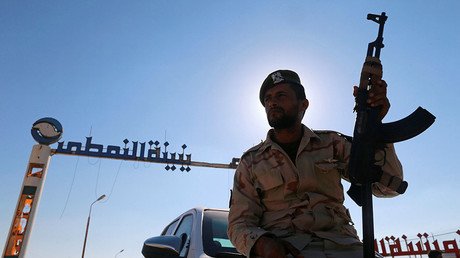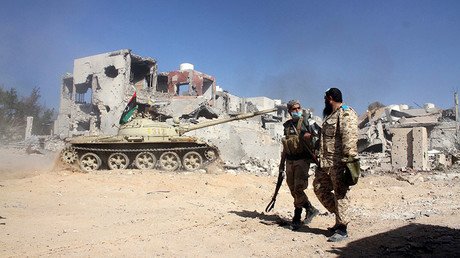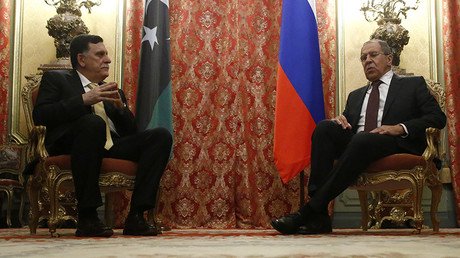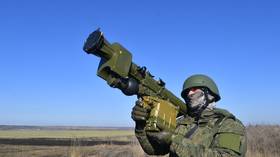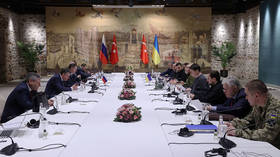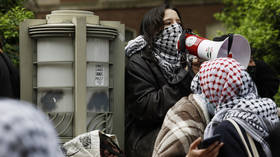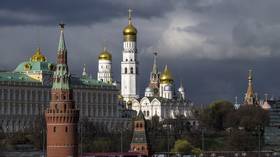West eyes recolonization of Africa by endless war; removing Gaddafi was just first step
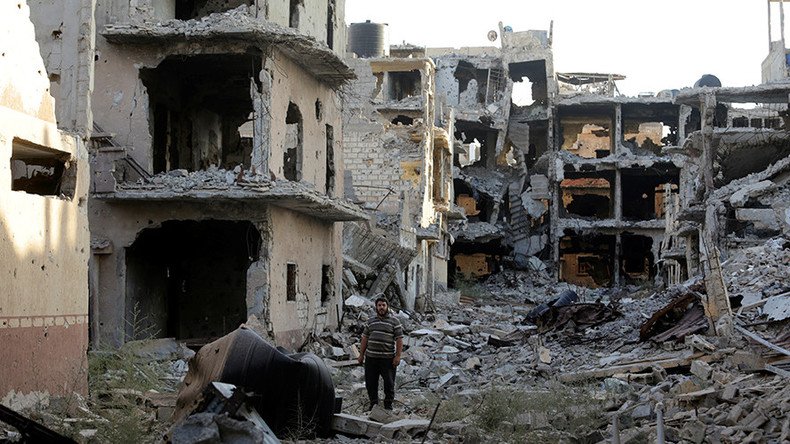
Exactly six years ago, on October 20th, 2011, Muammar Gaddafi was murdered, joining a long list of African revolutionaries martyred by the West for daring to dream of continental independence.
Earlier that day, Gaddafi’s hometown of Sirte had been occupied by Western-backed militias, following a month-long battle during which NATO and its ‘rebel’ allies pounded the city’s hospitals and homes with artillery, cut off its water and electricity, and publicly proclaimed their desire to ‘starve [the city] into submission’. The last defenders of the city, including Gaddafi, fled Sirte that morning, but their convoy was tracked and strafed by NATO jets, killing 95 people. Gaddafi escaped the wreckage but was captured shortly afterward. I will spare you the gruesome details, which the Western media gloatingly broadcast across the world as a triumphant snuff movie, suffice to say that he was tortured and eventually shot dead.
We now know, if testimony from NATO’s key Libyan ally Mahmoud Jibril is to be believed, it was a foreign agent, likely French, who delivered the fatal bullet. His death was the culmination of not only seven months of NATO aggression, but of a campaign against Gaddafi and his movement, the West had been waging for over three decades.
Yet it was also the opening salvo in a new war - a war for the militarily recolonization of Africa.
The year 2009, two years before Gaddafi’s murder, was a pivotal one for US-African relations. First, because China overtook the US as the continent’s largest trading partner; and second because Gaddafi was elected president of the African Union.
The significance of both for the decline of US influence on the continent could not be clearer. While Gaddafi was spearheading attempts to unite Africa politically, committing serious amounts of Libyan oil wealth to make this dream a reality, China was quietly smashing the West’s monopoly over export markets and investment finance. Africa no longer had to go cap-in-hand to the IMF for loans, agreeing to whatever self-defeating terms were on offer, but could turn to China - or indeed Libya - for investment. And if the US threatened to cut them off from their markets, China would happily buy up whatever was on offer. Western economic domination of Africa was under threat as never before.
The response from the West, of course, was a military one. Economic dependence on the West - rapidly being shattered by Libya and China - would be replaced by a new military dependence. If African countries would no longer come begging for Western loans, export markets, and investment finance, they would have to be put in a position where they would come begging for Western military aid.
To this end, AFRICOM - the US army’s new ‘African command’ - had been launched the previous year, but humiliatingly for George W. Bush, not a single African country would agree to host its HQ; instead, it was forced to open shop in Stuttgart, Germany. Gaddafi had led African opposition to AFRICOM, as exasperated US diplomatic memos later revealed by WikiLeaks made clear. And US pleas to African leaders to embrace AFRICOM in the ‘fight against terrorism’ fell on deaf ears.
After all, as Mutassim Gaddafi, head of Libyan security, had explained to Hillary Clinton in 2009, North Africa already had an effective security system in place, through the African Union’s ‘standby forces,' on the one hand, and CEN-SAD on the other. CEN-SAD was a regional security organization of Sahel and Saharan states, with a well-functioning security system, with Libya as the lynchpin. The sophisticated Libyan-led counter-terror structure meant there was simply no need for a US military presence. The job of Western planners, then, was to create such a need.
NATO’s destruction of Libya simultaneously achieved three strategic goals for the West’s plans for military expansion in Africa. Most obviously, it removed the biggest obstacle and opponent of such expansion, Gaddafi himself. With Gaddafi gone, and with a quiescent pro-NATO puppet government in charge of Libya, there was no longer any chance that Libya would act as a powerful force against Western militarism. Quite the contrary - Libya’s new government was utterly dependent on such militarism and knew it.
Secondly, NATO’s aggression served to bring about a total collapse of the delicate but effective North African security system, which had been underpinned by Libya. And finally, NATO’s annihilation of the Libyan state effectively turned the country over to the region’s death squads and terror groups. These groups were then able to loot Libya’s military arsenals and set up training camps at their leisure, using these to expand operations right across the region.
It is no coincidence that almost all of the recent terror attacks in North Africa - not to mention Manchester - have been either prepared in Libya or perpetrated by fighters trained in Libya. Boko Haram, Al-Qaeda in the Islamic Maghreb, ISIS, Mali’s Ansar Dine, and literally dozens of others, have all greatly benefited from the destruction of Libya.
By ensuring the spread of terror groups across the region, the Western powers had magically created a demand for their military assistance which hitherto did not exist. They had literally created a protection racket for Africa.
In an excellent piece of research published last year, Nick Turse wrote how the increase in AFRICOM operations across the continent has correlated precisely with the rise in terror threats. Its growth, he said, has been accompanied by “increasing numbers of lethal terror attacks across the continent including those in Burkina Faso, Burundi, Cameroon, Central African Republic, Chad, Côte d’Ivoire, Democratic Republic of the Congo, Ethiopia, Kenya, Mali, Niger, Nigeria, Somalia, South Sudan, and Tunisia.
In fact, data from the National Consortium for the Study of Terrorism and Responses to Terrorism at the University of Maryland shows that attacks have spiked over the last decade, roughly coinciding with AFRICOM’s establishment. In 2007, just before it became an independent command, there were fewer than 400 such incidents annually in sub-Saharan Africa. Last year, the number reached nearly 2,000. By AFRICOM’s own official standards, of course, this is a demonstration of a massive failure. Viewed from the perspective of the protection racket, however, it is a resounding success, with US military power smoothly reproducing the conditions for its own expansion.
This is the Africa policy Trump has now inherited. But because this policy has rarely been understood as the protection racket it really is, many commentators have, as with so many of Trump’s policies, mistakenly believed he is somehow ‘ignoring’ or ‘reversing’ the approach of his predecessors. In fact, far from abandoning this approach, Trump is escalating it with relish.
What the Trump administration is doing, as it is doing in pretty much every policy area, is stripping the previous policy of its ‘soft power’ niceties to reveal and extend the iron fist which has in fact been in the driving seat all along. Trump, with his open disdain for Africa, has effectively ended US development aid for Africa - slashing overall African aid levels by one third, and transferring responsibility for much of the rest from the Agency for International Development to the Pentagon - while openly tying aid to the advancement of “US national security objectives.”
'US has enough roles': #Trump not interested in #Libya nation-buildingRead more: https://t.co/Cf0ndYHdoPpic.twitter.com/OfJDndQaL8
— RT America (@RT_America) April 20, 2017
In other words, the US has made a strategic decision to drop the carrot in favor of the stick. Given the overwhelming superiority of Chinese development assistance, this is unsurprising. The US has decided to stop trying to compete in this area, and instead to ruthlessly and unambiguously pursue the military approach which the Bush and Obama administrations had already mapped out.
To this end, Trump has stepped up drone attacks, removing the (limited) restrictions that had been in place during the Obama era. The result has been a ramping up of civilian casualties, and consequently of the resentment and hatred which fuels militant recruitment. It is unlikely to be a coincidence, for example, that the al Shabaab truck bombing that killed over 300 people in Mogadishu last weekend was carried out by a man from a town in which had suffered a major drone attack on civilians, including women and children, in August.
Indeed, a detailed study by the United Nations recently concluded that in “a majority of cases, state action appears to be the primary factor finally pushing individuals into violent extremism in Africa.” Of more than 500 former members of militant organizations interviewed for the report, 71 percent pointed to “government action,” including “killing of a family member or friend” or “arrest of a family member or friend” as the incident that prompted them to join a group. And so the cycle continues: drone attacks breed recruitment, which produces further terror attacks, which leaves the states involved more dependent on US military support. Thus does the West create the demand for its own ‘products.'
It does so in another way as well. Alexander Cockburn, in his book ‘Kill Chain,' explains how the policy of ‘targeted killings’ - another Obama policy ramped up under Trump - also increases the militancy of insurgent groups. Cockburn, reporting on a discussion with US soldiers about the efficacy of targeted killings, wrote that: “When the topic of conversation came round to ways of defeating the [roadside] bombs, everyone was in agreement. They would have charts up on the wall showing the insurgent cells they were facing, often with the names and pictures of the guys running them," Rivolo remembers. "When we asked about going after the high-value individuals and what effect it was having, they’d say, ‘Oh yeah, we killed that guy last month, and we’re getting more IEDs than ever.’ They all said the same thing, point blank: ‘[O]nce you knock them off, a day later you have a new guy who’s smarter, younger, more aggressive and is out for revenge.”’
Alex de Waal has written how this is certainly true in Somalia, where, he says, “each dead leader is followed by a more radical deputy. After a failed attempt in January 2007, the US killed Al Shabaab’s commander, Aden Hashi Farah Ayro, in a May 2008 air strike. Ayro’s successor, Ahmed Abdi Godane (alias Mukhtar Abu Zubair), was worse, affiliating the organization with Al-Qaeda. The US succeeded in assassinating Godane in September 2014. In turn, Godane was succeeded by an even more determined extremist, Ahmad Omar (Abu Ubaidah). It was presumably Omar who ordered the recent attack in Mogadishu, the worst in the country’s recent history. If targeted killing remains a central strategy of the War on Terror”, De Waal wrote, “it is set to be an endless war.”
But endless war is the whole point. For not only does it force African countries, finally freeing themselves from dependence on the IMF, into dependence on AFRICOM; it also undermines China’s blossoming relationship with Africa.
Chinese trade and investment in Africa continues to grow apace. According to the China-Africa Research Initiative at John Hopkins University, Chinese FDI stocks in Africa had risen from just two percent of the value of US stocks in 2003 to 55 percent in 2015, when they totaled $35 billion. This proportion is likely to rapidly increase, given that “Between 2009 and 2012, China’s direct investment in Africa grew at an annual rate of 20.5 percent, while levels of US FDI flows to Africa declined by $8 billion in the wake of the global financial crisis”. Chinese-African trade, meanwhile, topped $200 billion in 2015.
China’s signature ‘One Belt One Road’ policy - to which President Xi Jinping has pledged $124 billion to create global trade routes designed to facilitate $2 trillion worth of annual trade - will also help to improve African links with China. Trump’s policy toward the project was summarised by Steve Bannon, his ideological mentor, and former chief strategist in just eight words: “Let’s go screw up One Belt One Road.” The West’s deeply destabilizing Africa policy - of simultaneously creating the conditions for armed groups to thrive while offering protection against them - goes some way toward realizing this ambitious goal. Removing Gaddafi was just the first step.
The statements, views and opinions expressed in this column are solely those of the author and do not necessarily represent those of RT.

